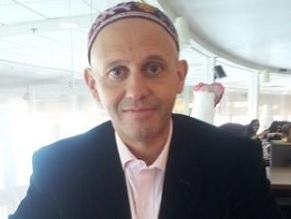|
World Jewish News

Rabbi Sergio Bergman Photo: TAMARA ZIEVE
|
From synagogue to parliament: South America's first rabbi-MP in the spotlight
29.01.2014, Jews and Society The 1994 bombing of the Jewish community center in Buenos Aires was the spark that ignited the fire behind the political career of Rabbi Sergio Bergman - the first rabbi to be voted into parliament in South America. In pursuit of justice, Bergman decided to trade in some of his time in synagogue for time on the streets, organizing weekly demonstrations in front of the Supreme Court, as part of a movement called Memoria Activa (active memory) - to remember what happened.
"To be a citizen is not only to live in a country; people need to be more involved and active," the reform rabbi, sporting his trademark colorful kippa, tells The Jerusalem Post over coffee at the Azrieli mall in Tel Aviv last week. "It wasn't a rational decision, it was a vocation," he says earnestly. The freshman congressman took office in December, after his PRO party won 34.5 percent of the vote in parliamentary elections in November.
Bergman met with the Post midway through a visit to Israel to speak at a conference at his old place of study, The Hebrew University, about how to take the Jewish vision to the wider society.
Bergman says that as a minority, Argentina's Jewish community must strengthen its identity. "Either you close your mind and live in a ghetto, or you're involved in general society with your identity. I'm not afraid of assimilation - when you're proud of your identity, and you have the knowledge and experience to grow with your particularity, you can make your contribution to the whole society," he says.
Of his precedent-setting position of a rabbi in parliament, he says that for many members of society this will present them with their first opportunity to know a rabbi. He emphasizes that he is not representing the Jewish community in his political role: "the community didn't put me in this place - the people did." He also points to the country's Jewish foreign minister, Hector Timerman, to illustrate that Jewish MPs don't represent some sort of agenda; indeed, the latter established the very committee that Bergman is battling against - the joint Iranian-Argentinian "truth committee" to investigate the bombing, for which Iran is the prime suspect.
"In the same country that you have a rabbi who became congressman, you have a Jewish person who is Foreign Minister, who signed an agreement with Iran... this is the evidence that we´re part of the whole of society," he states.
Bergman is working to have the agreement rolled back, but says it hasn't moved forward in any case, as it hasn't passed the vote in Iran yet. He opines that Tehran only agreed to cooperate in order to be taken off red alert on Interpol. "We don't think they really want justice, we say this agreement is not constitutional. It's ironic that they call it the Truth Committee."
He says he doesn't know why nothing happened on the matter in a year: "everything is unclear and we suspect it is about economic interests between Argentina and Iran."
He sees his new position as a privilege, emphasizing that "a rabbi is a teacher" and that he doesn’t separate the role of rabbi and MP. "For me it's only one role - two parts of the same man... it's the same approach. It's important for me keep my roots as a rabbi working in the community."
"Love your neighbor as yourself, is not just a Jewish approach," he says. "We can fix the world together, and because of that, I think that my religious approach is very important. Because the pragmatics of politics is very difficult - the power of faith helps."
Bergman has written books on how, from a Jewish perspective, one can enrich the common mission and values of people. He also expresses a strong belief in the separation of religion and state, saying that religion should be a personal choice and that Israel's situation is problematic. "One thing is state one is personal conscience," he explains. "[Being] Jewish is not only [being] religious: it's culture, tradition, it also includes poetry, music. It's a problem when Jewish spirituality is only in the hands of the religious leaders. We need to be more pluralistic."
He says that polarization is not good for Israel or the Jewish world, and that we must take care of fundamentalism "in our own family" before criticizing it elsewhere. He mentions the role of men and women in Judaism, and when questioned on his opinion of Women of the Wall, describes the group as a "perfect example." He lauds the women for their courage to push forward the approach that "the Western Wall is for all the Jewish people, and not only for the haredim."
"Judaism is stronger when you have more opportunities, weaker when you only have one," he asserts.
Addressing Israel's image in his country, he says: "We are in a problem - because people take the picture that the media delivers, and we try to do Israel advocacy, but we don't have support or money." He says anti-Zionism has become a new type of anti-Semitism, with people using terms such as "Nazis" and "apartheid" to describe Israel. He says, however, that there is only a minority of anti-Semitics in Argentina, and the Jewish people are very well integrated into every part of society there.
In his opinion, a global approach is needed to manage the issue of Israel's image. He puts faith in his countryman Pope Francis, who is set to visit Israel in May, as an important actor who can help with the peace process and in putting across another point of view of the state of Israel. "He is a good friend of the Jewish people," he affirms.
JPost.com
|
|
